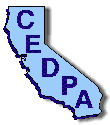
 |
California Educational Data Processing Association |
The DataBus - Vol. 37, No. 2
|
When I first heard of the California Multiple Award Schedule, I was less than impressed. Given the privilege of buying things the same way the Air Force buys coffee pots didn't seem like that great a deal. The prices I saw from the first dozen vendor catalogs were less than spectacular as well. Just another boondoggle, right?
Maybe. I still think that buying things blindly from a CMAS catalog is not a good idea, but the program has opened up another opportunity for our District. We are having work done now by an excellent company, at a price that saved us money. Tulare City Schools is completing the installation of a District-Wide WAN, with Fiber and Cat-5 LANs at each of our 11 school sites, and 10mbps wireless connections to our District Office and the 'net. A few months ago, it seemed we would never be able to meet our schedule. Here's the some of our case history, and the best news yet about CMAS.
In early '96 we had a WAN plan drawn up by a consultant. We put it out to bid in October, and received bids ranging from $700k to $1.1 million. We also received complaints, threats, and whining from several of the bidders involved. Worse yet, several of the bidders seemed to be out of their depth. This is a major project, with all the work to be completed in only a few months. Low bids by companies like "Joe's Video Repair and LAN Service" didn't inspire confidence.
Enter CMAS. The program allows us to negotiate directly with a pre-approved vendor, and contract for the work to be done. That solves the 'low bid syndrome' rather nicely, but what about cost? In early November, we invited 8 major contractors (with CMAS approval) to our site for a walk-through. Instead of a bid, we asked for proposals. Given that our specifications were now well over a year old, we knew there were improvements that could and should be made. Within three weeks, we had 6 proposals back, each one from a company with a genuine track record in jobs of this size. This time, we had the freedom to choose the best one, not necessarily the cheapest. After evaluating the various options, and negotiating some details with our vendor of choice, we accepted a proposal and began work.
Having been used to dealing with whomever was low bid on a given job, the difference is phenomenal. We are working with professionals, and it's a refreshing change. Every facet of the project is planned and scheduled, and right on track. No surprises! We are installing an up-to-the-minute switched, managed network system instead of the old-style hub and router system we had spec'd, and for about the same money as our previous low bid.
The key here is twofold. First, we were working on a project that was large enough to earn the attention of major players. Second, since we were open in our negotiations up front, each company knew who the competition was, and was likely to make their best efforts at keeping our cost low. The end result has been much more than satisfactory.
CMAS has a limit of $500,000 per contract that applies to State agencies. Local entities may waive even that limit, if desired. Vendors must have a valid contract with the state for each catagory of goods or services, and the state gets a fee of 1.21%. For more information about CMAS, try www.pd.dgs.ca.gov/cmas/howtouse.htm.